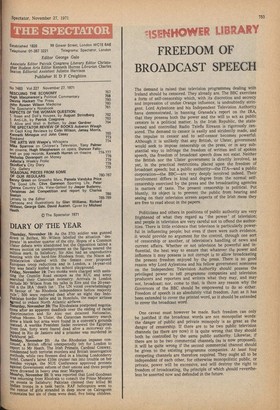.10tfritilOWER. LIBRAR4
FREEDOM OF BROADCAST SPEECH
The demand is raised that television programmes dealing with Ireland should be censored. They already are. The BBC exercises a form of self-censorship which, with its discretion and secrecy and impression of undue Orange influence, is undoubtedly stringent. Lord Aylestone and his Independent Television Authority have demonstrated, in banning Granada's report on the IRA, that they possess both the power and the will to act as public censors in a political matter. In the Irish Republic, the stateowned and controlled Radio Telefis Eireann is rigorously censored. The demand to censor is easily and stridently made, and the impulse to censor and to self-censor becomes powerful. Although it is unlikely that any British, or Ulster, government would seek to impose censorship on the press, or in any substantial way to infringe the freedom of written and of spoken speech, the freedom of broadcast speech does not exist. Neither the British nor the Ulster government is directly involved, as yet, in the practical restrictions placed upon the freedom of broadcast speech; but a public authority—the ITA—and a public corporation—the BBC—are very deeply involved indeed. Their involvement differs in kind and degree from the normal selfcensorship exercised by the press and the broadcasting agencies in matters of taste. The present censorship is political. Put bluntly, its object is to prevent the public from hearing and seeing on their television screen aspects of the Irish mess they are free to read about in the papers.
Politicians and others in positions of public authority are very frightened of what they regard as 'the power' of television; and people in television are very careful not to offend the authorities. There is little evidence that televison is particularly powerful in influencing people; but even if there were such evidence, it would provide no argument for the control, through one sort of censorship or another, of television's handling of news and current affairs. Whether or not television be powerful and influential, the best way to ensure that whatever the power and influence it may possess is not corrupt is to allow broadcasting the present freedom enjoyed by the press. There is no good reason why Lord Aylestone and his fellow government nominees on the Independent Television Authority should possess the privileged power to tell programme companies and television producers and reporters and writers what they may, and may not, broadcast; nor, come to that, is there any reason why the Governors of the BBC should be empowered to do so either. Freedom of speech is an absolutely vital freedom. Just as it has been extended to cover the printed word, so it should be extended to cover the broadcast word.
One caveat must however be made. Such freedom can only be justified if the broadcast words are not monopolist words: the danger of public and private monopoly is as great as the danger of censorship. If there are to be two public television channels (as there are now) it is quite wrong that they should both be controlled by the same public authority. Likewise, if there are to be two commercial channels (as is now proposed), it will be quite wrong if the second commercial channel should be given to the existing programme companies. At least four competing channels are therefore required. They ought all to be independent of each other, for otherwise monopolistic public, or private, power will be excessive, and will destroy the right to freedom of broadcasting, the principle of which should revertheless be asserted now and defended in the future.














































 Previous page
Previous page